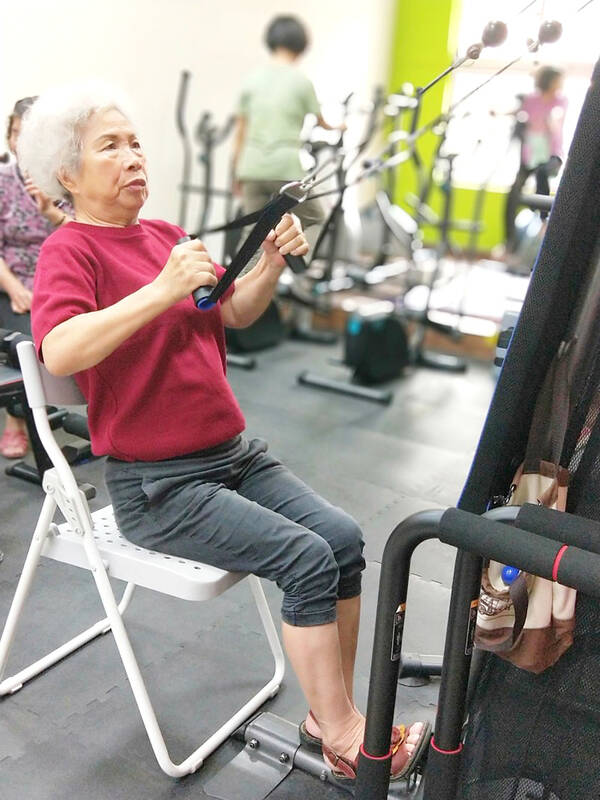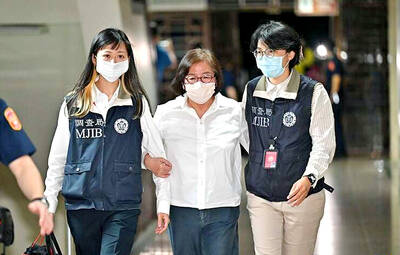Many elderly people aged 65 years or older might experience hip fractures when they fall down, but getting surgery would not be enough to fully recover, and postoperative rehabilitation is crucial for standing up again, the Taiwanese Osteoporosis Association (TOA) said yesterday.
The TOA yesterday held the Fragility Fracture Network (FFN) Taiwan founding conference in Taipei, where TOA chairperson and Kaohsiung Municipal Da-Tung Hospital orthopedist Chen Chung-hwan (陳崇桓) was named adjunct chairperson of the network.
The FFN addresses the full pathway of care for fragility fracture patients, and has been promoting improvements across four main pillars of care that include perioperative care, surgical treatment, rehabilitation, secondary prevention and policy change, the association said, adding that it has expanded its congress in different regions worldwide with participants from 102 countries.

Photo: Lin Liang-che, Taipei Times
Chen said the FFN Taiwan consists of orthopedists, geriatricians, rehabilitation physicians, nurses, physical therapists, occupational therapists, nutritionists and other healthcare professionals, and it aims to integrate resources for maximizing effectiveness in improving the quality of fragility fracture treatment in Taiwan.
According to the National Health Promotion Administration’s national nutrition survey between 2017 and 2020, the prevalence of osteoporosis among adults aged 50 or older was 8.1 percent, but the prevalence among women was higher — about 10 percent were estimated to have osteoporosis.
Chen said most hip fractures occur in elderly people and are caused by falling, and as women have higher rates of weakened bones by osteoporosis and weaker muscle strength, they have a higher risk of getting a hip fracture from a fall than men.
However, the postoperative healthcare they receive is crucial for recovery, as many who return home only to lay in bed, instead of undergoing physical rehabilitation, would have poor outcomes of rapid muscle loss and the inability to stand up and walk, becoming long-term bedridden patients, he said.
West Garden Hospital rehabilitation physician Hsu Po-cheng (徐伯誠) said about half of hip fracture patients need assistive devices or other people’s help to stand up after surgery, and about 90 percent need assistance to climb stairs, so many might lose their mobility to enjoy a full and active life.
However, if people do not practice moving around after the surgery, they could lose bone mass and muscle strength rapidly within a few months, he said, adding that therefore, they should try to leave their bed as soon as possible and get physical rehabilitation to gradually recover to preoperative conditions.
As people would need to add different exercises into their rehabilitation routine depending on their preoperative exercise habits, health conditions, complications and medications, customized plans and supervision might need a medical team with different health professionals, Hsu said.
Chen said the National Health Insurance policy says that large hospitals are responsible for acute treatment, but patients must be transferred to local hospitals or facilities for post-acute care.
Therefore, the FFN Taiwan would launch a hip fracture registry program with a hospitals this year, he said.
The FFN is to collect data from people to better understand what can be improved in the nation’s fragility fracture healthcare system, and try to obtain more resources to improve it, Chen added.
Additional reporting by CNA

Costa Rica sent a group of intelligence officials to Taiwan for a short-term training program, the first time the Central American country has done so since the countries ended official diplomatic relations in 2007, a Costa Rican media outlet reported last week. Five officials from the Costa Rican Directorate of Intelligence and Security last month spent 23 days in Taipei undergoing a series of training sessions focused on national security, La Nacion reported on Friday, quoting unnamed sources. The Costa Rican government has not confirmed the report. The Chinese embassy in Costa Rica protested the news, saying in a statement issued the same

Taiwan is to extend its visa-waiver program for Philippine passport holders for another year, starting on Aug. 1, Minister of Foreign Affairs Lin Chia-lung (林佳龍) said on Friday. Lin made the announcement during a reception in Taipei marking the 127th anniversary of Philippine independence and the 50th anniversary of the establishment of the Manila Economic and Cultural Office (MECO) in Taiwan, the Ministry of Foreign Affairs said. The decision reflected Taiwan’s commitment to deepening exchanges with the Philippines, the statement cited Lin as saying, adding that it was a key partner under the New Southbound Policy launched in 2016. Lin also expressed hope

Temperatures in New Taipei City’s Sindian District (新店) climbed past 37°C yesterday, as the Central Weather Administration (CWA) issued heat alerts for 16 municipalities, warning the public of intense heat expected across Taiwan. The hottest location in Taiwan was in Sindian, where the mercury reached 37.5°C at about 2pm, according to CWA data. Taipei’s Shilin District (士林) recorded a temperature of 37.4°C at noon, Taitung County’s Jinfeng Township (金峰) at 12:50 pm logged a temperature of 37.4°C and Miaoli County’s Toufen Township (頭份) reached 36.7°C at 11:40am, the CWA said. The weather agency yesterday issued a yellow level information notice for Taipei, New

CASE: Prosecutors have requested heavy sentences, citing a lack of remorse and the defendants’ role in ‘undermining the country’s democratic foundations’ Five people affiliated with the Chinese Nationalist Party (KMT), including senior staff from the party’s Taipei branch, were indicted yesterday for allegedly forging thousands of signatures to recall two Democratic Progressive Party (DPP) lawmakers. Those indicted include KMT Taipei chapter director Huang Lu Chin-ru (黃呂錦茹), secretary-general Chu Wen-ching (初文卿) and secretary Yao Fu-wen (姚富文), the Taipei District Prosecutors’ Office said in a news release. Prosecutors said the three were responsible for fabricating 5,211 signature forms — 2,537 related to the recall of DPP Legislator Wu Pei-yi (吳沛憶) and 2,674 for DPP Legislator Rosalia Wu (吳思瑤) — with forged entries accounting for